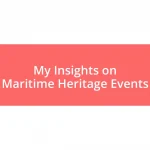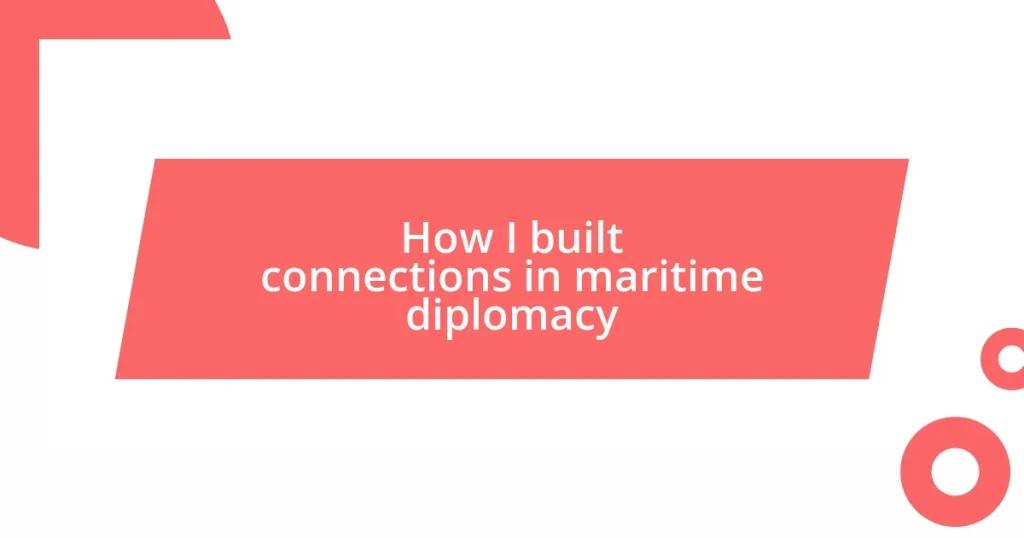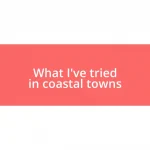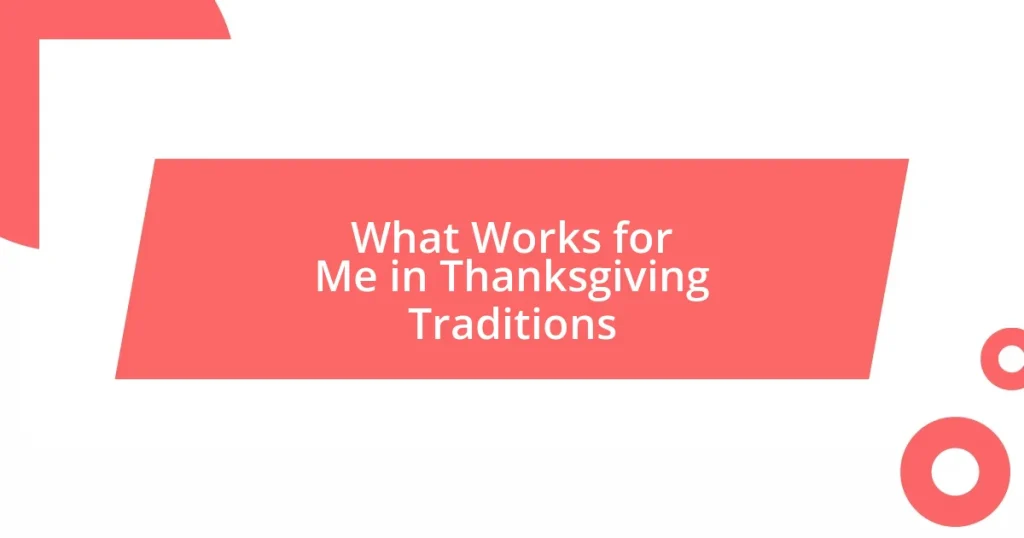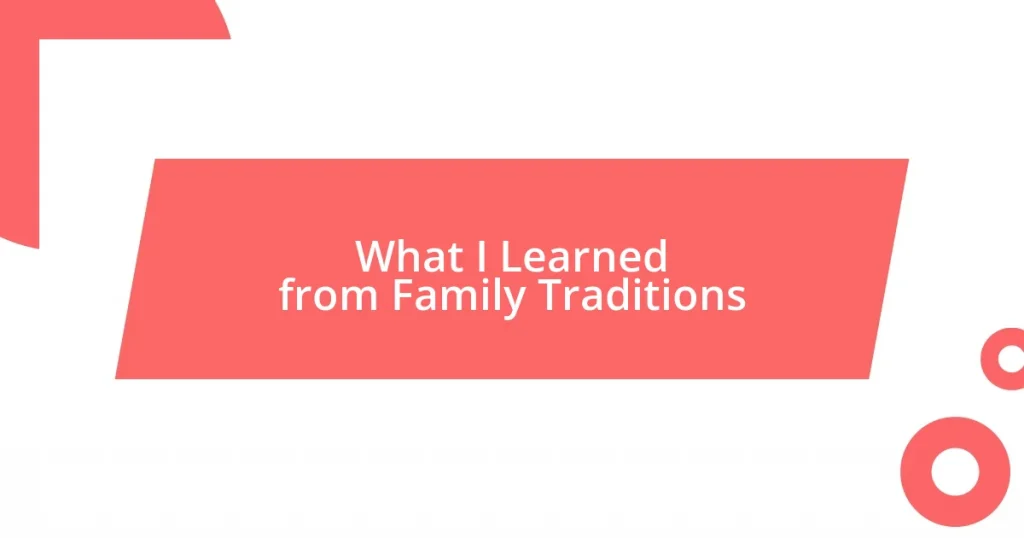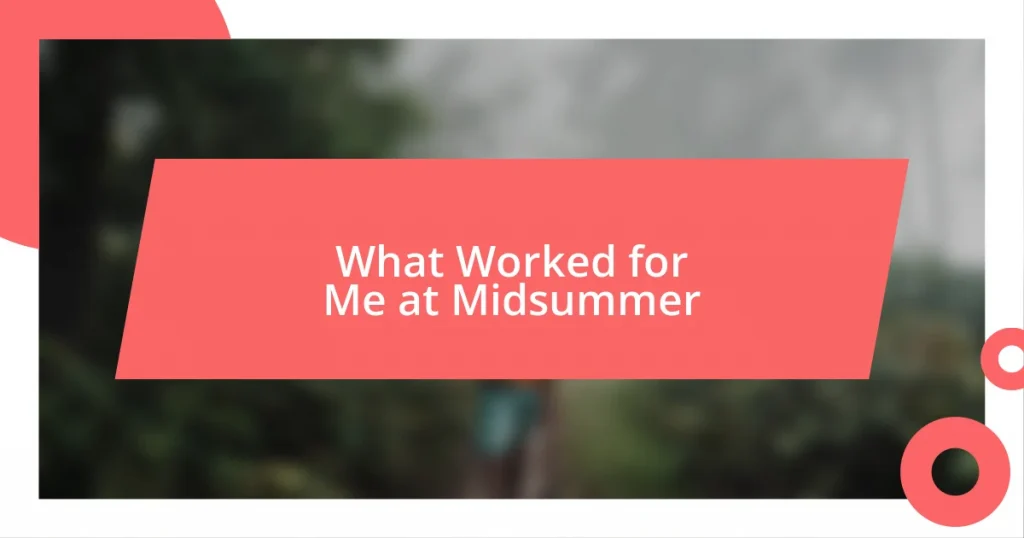Key takeaways:
- Maritime diplomacy thrives on collaboration and understanding diverse perspectives, as exemplified by international summits addressing common challenges like piracy and environmental protection.
- Identifying and engaging a wide range of stakeholders, including NGOs and local communities, is essential for effective maritime diplomacy and decision-making that respects all voices.
- Building and maintaining trust through shared interests, transparent communication, and shared experiences fosters long-lasting partnerships critical to successful maritime diplomacy.
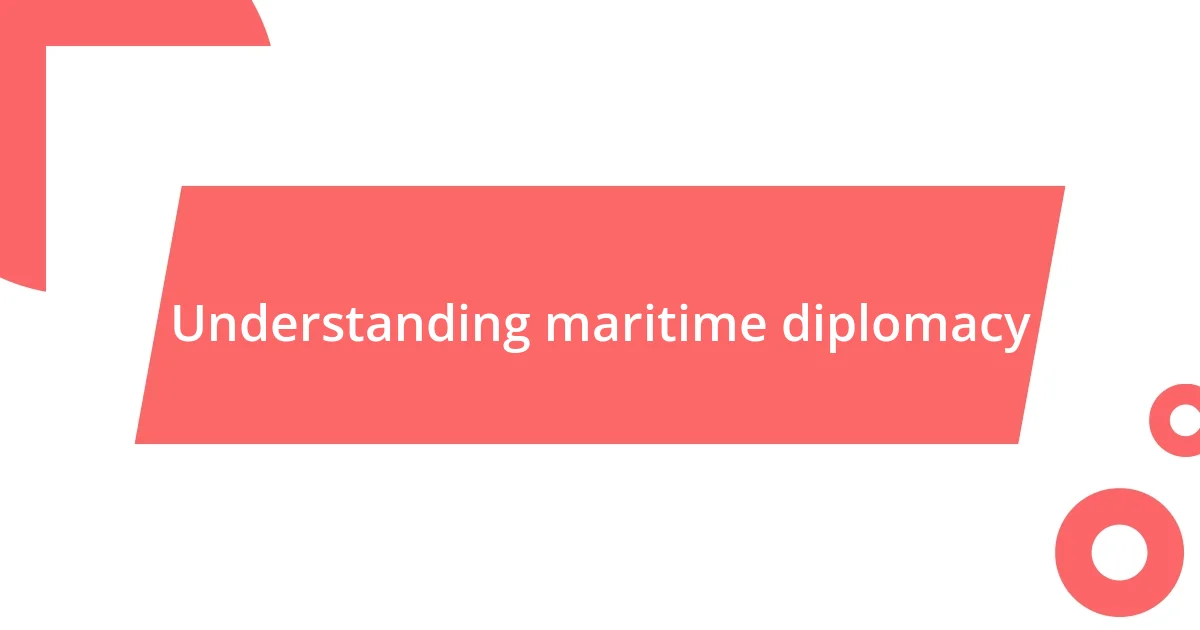
Understanding maritime diplomacy
Maritime diplomacy is a nuanced field where the seas become the stage for international dialogue and relations. I often think about the years spent at sea, where a simple ship-to-ship exchange turned into meaningful conversations about shared interests and mutual respect. Doesn’t it make you wonder how these interactions shape our worldviews on global cooperation?
As I navigated complex waters—both literally and figuratively—what struck me most was the power of collaboration. I remember a time during a regional maritime summit when delegates from various nations came together to address shared challenges, such as piracy and environmental protection. It was a vivid reminder of how shared maritime interests can forge deep connections, catalyzing cooperative agreements that benefit all parties involved.
Moreover, the maritime realm is rich with cultural diversity, and each encounter offers a unique lens on diplomacy. I learned that understanding local customs and perspectives can enhance these connections significantly. Engaging with counterparts from different nations taught me to value empathy and patience in discussions—traits that are essential in crafting long-lasting partnerships on the water. How can we apply these lessons to our own diplomatic endeavors?
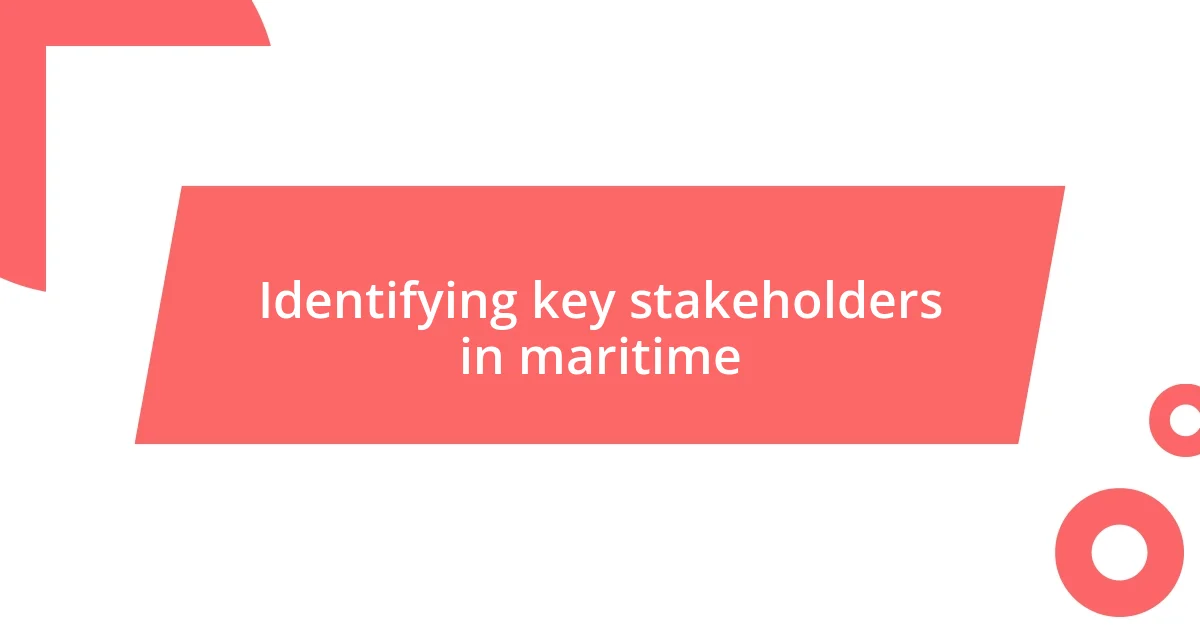
Identifying key stakeholders in maritime
Identifying key stakeholders in maritime diplomacy requires a keen awareness of who influences decisions at sea. From my experience, I found that government officials, naval officers, and industry leaders significantly shape maritime policies and relationships. Often, I would engage with local fishermen, whose insights into maritime conservation were invaluable; they showed me that stakeholders can come from the most unexpected places.
During one maritime conference, I discovered the critical role of non-governmental organizations (NGOs) in advocating for sustainable practices. Conversations with representatives from these groups revealed their unique perspectives on marine biodiversity. This experience solidified my belief that effective diplomacy must involve a diverse array of voices, including those often overshadowed by political dialogues.
The importance of identifying stakeholders extends beyond just engaging governmental figures; it involves understanding the broader community affected by maritime activities. I recall how local communities came together to present their concerns about shipping routes disrupting marine ecosystems. Their passion and urgency inspired me to advocate for inclusion in decision-making processes that impact their livelihoods and environments.
| Stakeholder Category | Examples |
|---|---|
| Government Officials | Ministers, Local Authority Representatives |
| Industry Leaders | Shipping Companies, Maritime Corporations |
| NGOs | Environmental Groups, Advocacy Organizations |
| Local Communities | Fishermen, Coastal Residents |
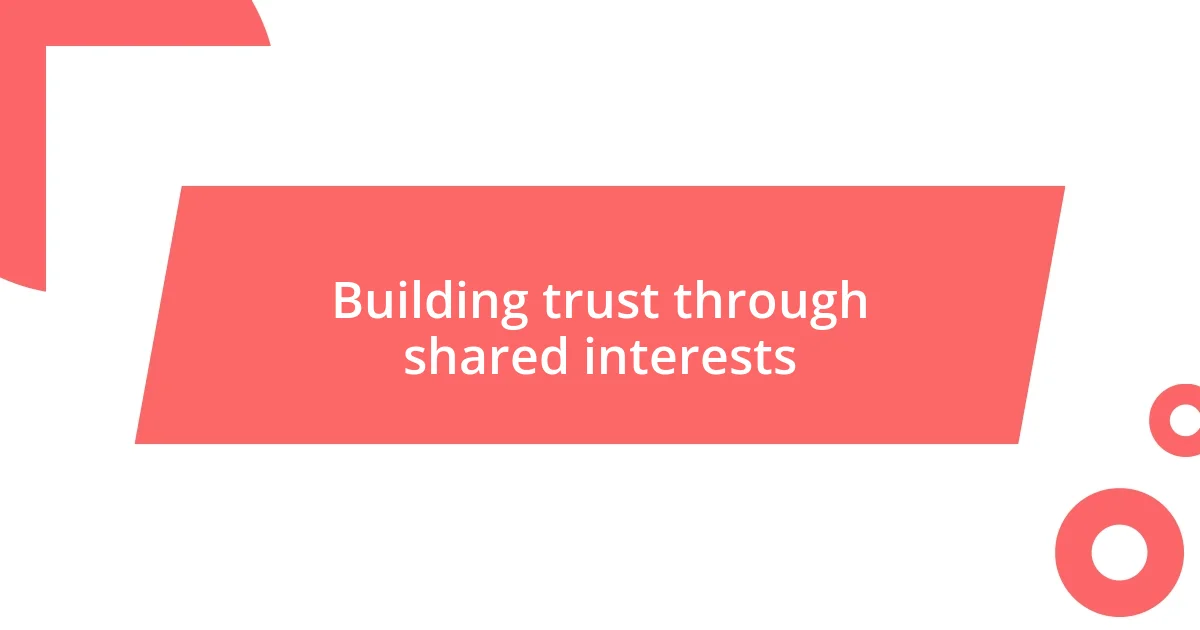
Building trust through shared interests
Building trust in maritime diplomacy hinges on finding common ground through shared interests. I remember sitting with a group of naval personnel from different nations, all of us tired after a long day of discussions. As we shared sea stories over dinner, I felt walls crumbling. We laughed about the quirks of navigating unpredictable weather, realizing that beneath our uniforms, we were all sailors with a passion for the ocean. This intimacy fostered a sense of camaraderie that translated into more productive talks the following day.
To cultivate trust, it’s crucial to identify and capitalize on these shared interests. Here are some strategies that have worked for me:
- Participate in collaborative projects: Joint initiatives, such as environmental clean-up operations, provide a hands-on way to connect.
- Organize informal gatherings: Socializing outside formal settings often leads to more genuine conversations.
- Highlight mutual challenges: Discussing common issues, like maritime security, encourages a collective approach to problem-solving.
- Engage in cultural exchanges: Learning about each other’s maritime traditions fosters respect and deepens relationships.
- Celebrate maritime heritage together: Participating in shared commemorations or festivals can unify diverse groups around common values.
Finding these threads of connection not only builds trust but also cultivates lasting partnerships that extend far beyond the negotiating table.
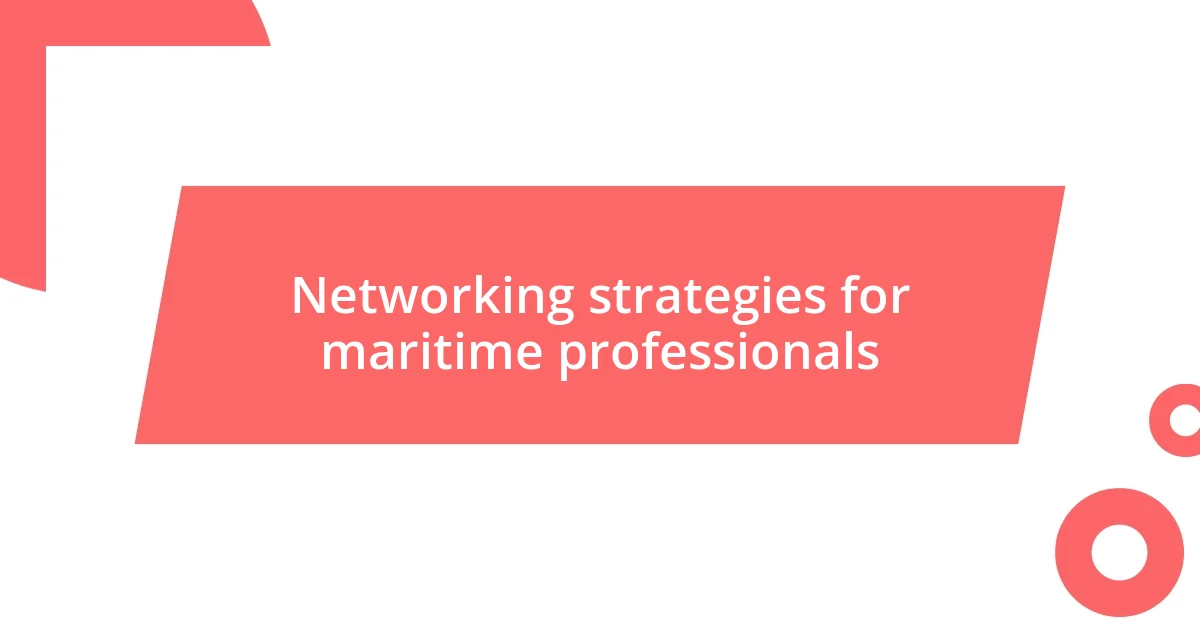
Networking strategies for maritime professionals
Networking in the maritime field requires a blend of creativity and strategy. One of my most effective tactics has been attending industry-specific events where informal conversations often lead to substantial collaborations. I remember being at a maritime trade show, feeling somewhat overwhelmed by the crowd. While sipping coffee, I struck up a chat with a representative from a leading shipping company, and we ended up discussing the future of sustainable shipping practices. That unexpected conversation blossomed into a partnership that we both value to this day.
Another strategy that I found really beneficial is leveraging social media platforms tailored for professionals, such as LinkedIn. It might seem daunting at first, but I’ve discovered that sharing insights about maritime trends can attract like-minded individuals. I once posted about an innovative shipping technology, and a fellow maritime consultant reached out for a deeper discussion. With each interaction, I not only expanded my network but also enriched my understanding of industry challenges.
Additionally, never underestimate the power of mentorship. I’ve always believed that seeking out and offering guidance can unlock doors you didn’t know existed. Early in my career, I paired up with an experienced diplomat who offered priceless advice on navigating complex negotiations. In turn, I’ve taken on mentees to share my experiences, which has added depth to my own understanding of maritime diplomacy. How do you approach networking in your field? I’ve found that a generous mindset often leads to fruitful connections.
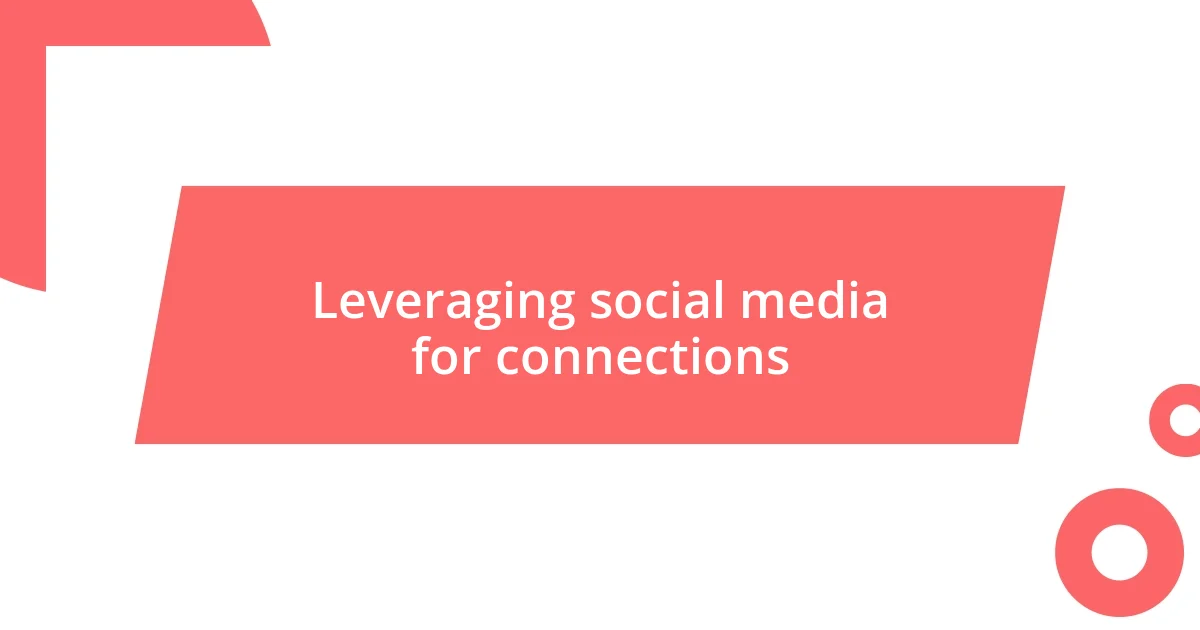
Leveraging social media for connections
Leveraging social media has been a game-changer in my quest for connections within maritime diplomacy. I recall a time on Twitter when I shared a thought-provoking article about marine conservation. To my surprise, it caught the attention of an influential maritime researcher in another country. We ended up having a meaningful exchange that not only broadened my perspective but also led to collaborative efforts on a joint research project. It’s moments like these that show the vast potential of social media.
Engagement doesn’t just stop at sharing; it’s vital to actively comment on others’ posts, too. For instance, I often find myself engaging with discussions on LinkedIn about maritime security policies. By contributing my views and asking questions, I’ve been able to connect with professionals I wouldn’t have encountered otherwise. Each comment creates an opportunity—like when one comment sparked a virtual coffee chat that deepened our professional relationship. Can you see how such interactions can build bridges that wouldn’t exist without that digital platform?
Furthermore, social media also serves as a window into the cultures of your international peers. I once shared a video of a maritime event from my country, showcasing our unique traditions. The response was incredible! Colleagues from abroad chimed in with their own cultural practices, creating an enriching dialogue. This not only heightened my understanding of global maritime practices but also built a network of friends who share a common passion. Isn’t it fascinating how a simple post can weave together diverse narratives and foster a genuine sense of community?
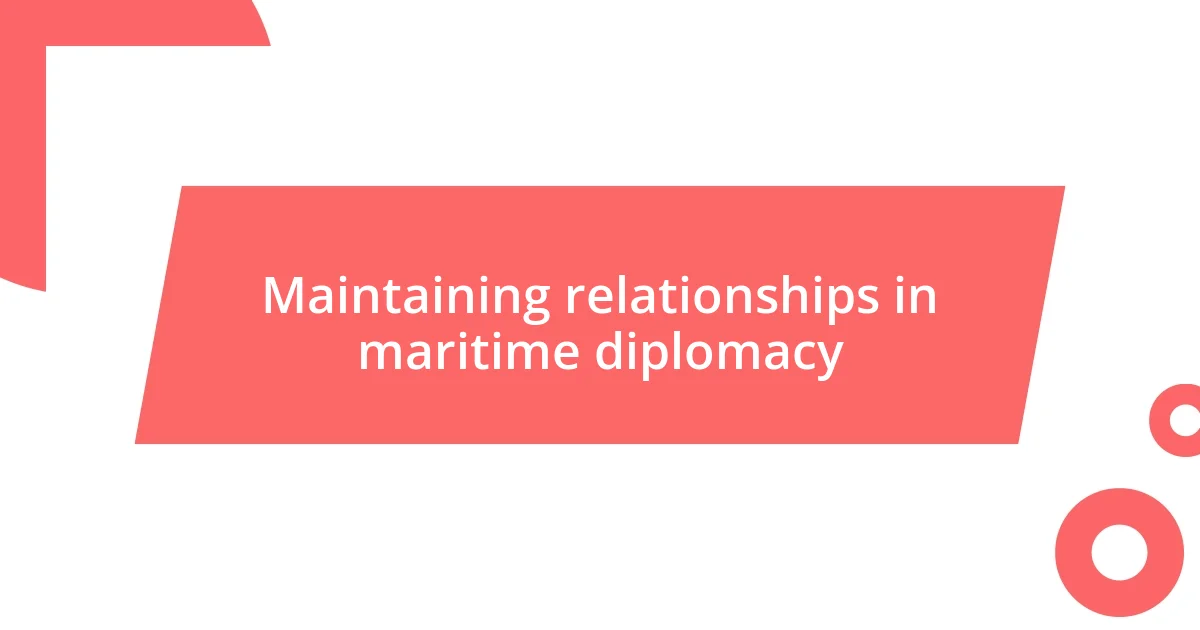
Maintaining relationships in maritime diplomacy
To maintain relationships in maritime diplomacy, consistent communication is crucial. I make it a point to follow up after meetings or significant interactions. One time, I reached out to a colleague after an international conference, sharing a publication related to a topic we discussed. This act of thoughtfulness sparked a refreshing dialogue, ensuring our connection was not just a fleeting moment but a lasting partnership. How do you keep the conversation going in your professional circles?
Building trust takes time, especially in a field as dynamic as maritime diplomacy. I’ve learned that being transparent about intentions fosters stronger bonds. For instance, during a joint project, I openly discussed my concerns about timelines, which prompted a mutual understanding that improved our collaboration. This honesty cleared up potential misunderstandings and solidified our relationship moving forward. Have you found that honesty can pave the way for deeper connections in your work?
Creating shared experiences is another powerful way to maintain connections. I arranged a team-building exercise involving a maritime simulation game, where participants had to navigate challenges together. The laughter and challenges we faced fostered camaraderie that translated into stronger professional relationships. I still reminisce about that day, as it not only provided fun but also reinforced our collaborative spirit. What shared experiences have you facilitated to bolster your network?









